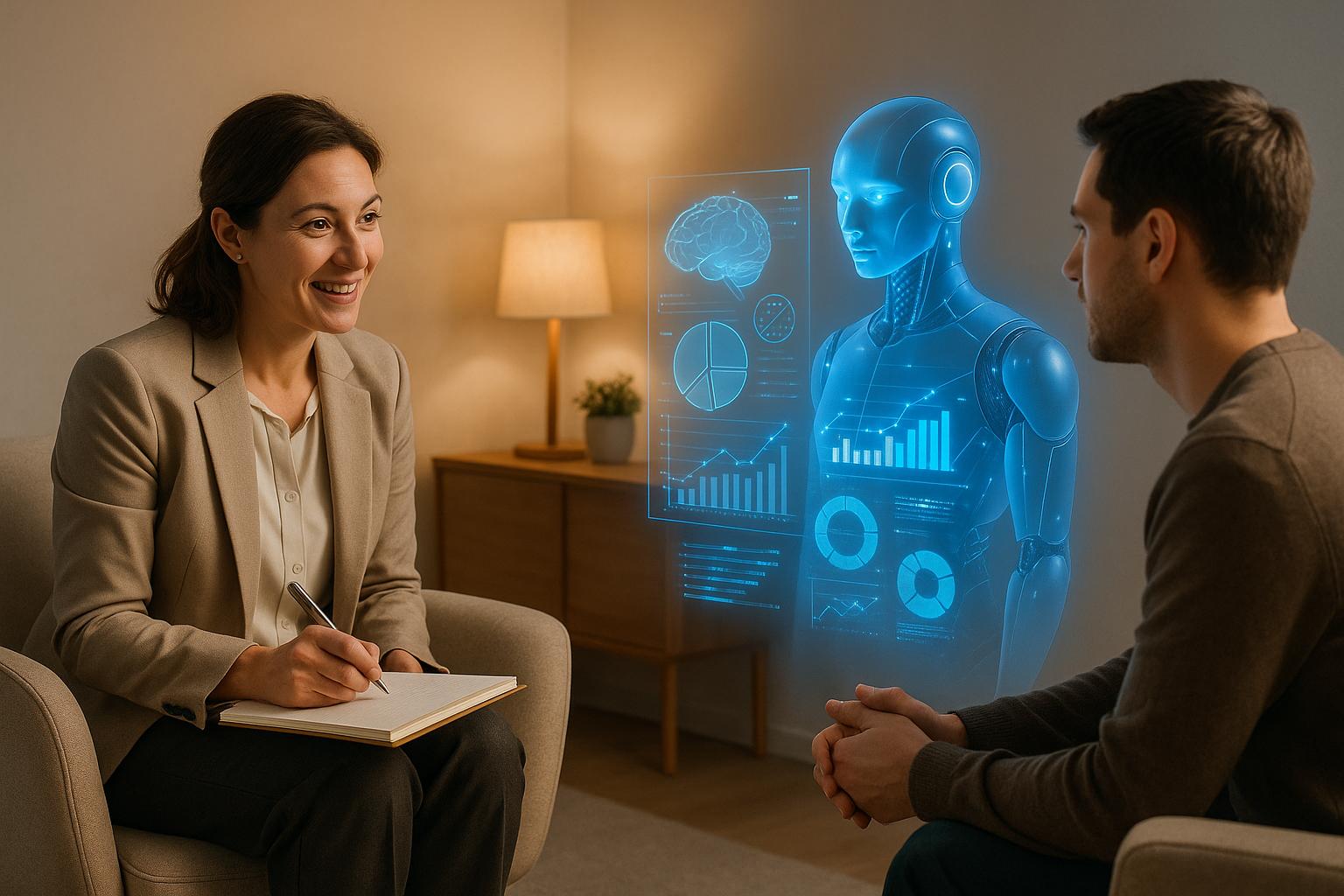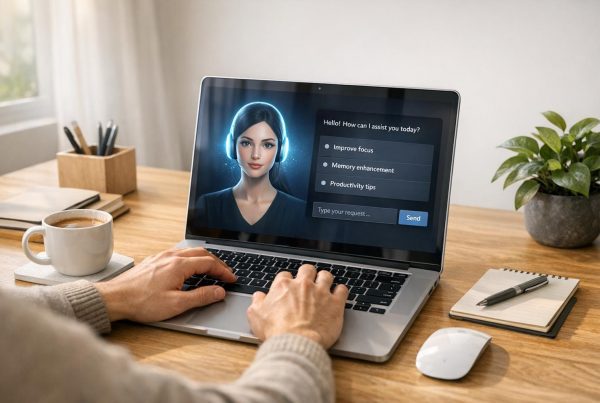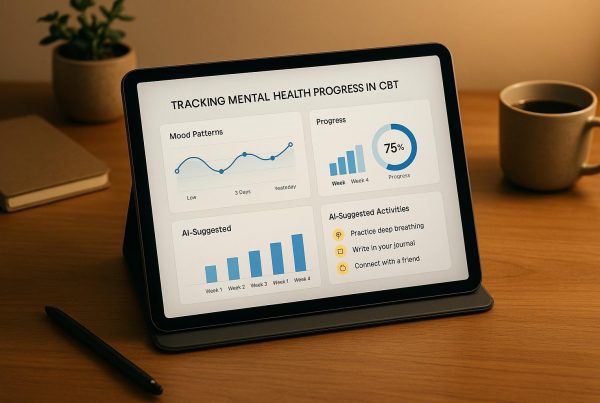AI and human coaches are reshaping personal growth, skill development, and mental health support, but the ethical debate is heating up. Both approaches have strengths and challenges, particularly in accountability, empathy, personalization, and privacy. Here’s what you need to know:
- AI Coaches: Offer 24/7 availability, data-driven insights, and scalable support. However, they may struggle with emotional nuances and accountability when things go wrong.
- Human Coaches: Bring emotional intelligence, adaptability, and a personal touch. Yet, they are limited by availability and may introduce personal biases.
- Key Ethical Concerns: Data privacy, algorithmic bias, and transparency are critical issues for AI. Human coaches face challenges with consistency, unconscious bias, and confidentiality.
Quick Comparison
| Factor | AI Coaching | Human Coaching |
|---|---|---|
| Availability | 24/7 | Limited to scheduled sessions |
| Empathy | Limited to patterns in data | Deep emotional understanding |
| Accountability | Shared across developers | Personal and professional oversight |
| Privacy | Data encryption and compliance | Ethical responsibility |
| Scalability | Unlimited users | One-on-one only |
The future lies in hybrid models. Combining AI’s efficiency with human intuition could create a balanced coaching solution that addresses ethical concerns while maximizing effectiveness.
Do Human Coaching and AI Coaching Need to Coexist?
Accountability: AI vs. Human Coaches
As coaching practices evolve, so do the ethical considerations surrounding accountability. This concept, which defines responsibility, error correction, and client protection, takes on different forms in AI-driven and human-led coaching. The primary distinction lies in how accountability is structured and upheld in each context.
How AI Coaching Ensures Accountability
AI coaching systems rely on precise digital monitoring to establish accountability. Unlike human coaches, who may depend on subjective judgment, AI platforms generate detailed records of every interaction, decision, and recommendation. This creates a transparent and objective trail of coaching activities.
Take Aidx.ai, for example. This platform tracks client well-being, stress levels, and confidence metrics in real time, providing a measurable record of coaching effectiveness. Supervisors can access these insights through the Practitioner Dashboard, which aggregates data while safeguarding individual privacy. This enables oversight without breaching confidentiality.
AI systems also incorporate self-improvement mechanisms. Algorithmic updates and continuous learning allow these platforms to adjust and enhance performance over time, often without requiring human intervention.
Another layer of accountability in AI coaching lies in compliance. Platforms like Aidx.ai are designed to meet stringent standards such as GDPR, employ full encryption, and maintain auditable privacy protocols. This ensures that the technology company remains legally responsible for data protection and ethical AI practices.
However, accountability in AI coaching isn’t without its challenges. When an AI coach’s advice leads to negative outcomes, it can be difficult to assign responsibility. Is it the fault of the algorithm developer, the training data, the platform operator, or even the user? This shared responsibility model complicates the process of assigning blame or seeking remedies.
How Human Coaches Maintain Accountability
Human coaches approach accountability through personal and professional oversight. Certification systems and ethical codes play a central role. For instance, organizations like the International Coach Federation (ICF) require coaches to complete rigorous training, pass competency exams, and commit to ongoing professional development. These measures establish a clear framework of responsibility.
Personal liability is another cornerstone of accountability for human coaches. Licensed professionals often carry insurance and face consequences such as disciplinary actions, license revocation, or legal repercussions for ethical breaches or misconduct. This personal stake in outcomes encourages responsible and ethical practices.
Human coaches also prioritize transparency. Before starting a coaching relationship, they provide informed consent, explaining their methods, limitations, and potential risks. They set clear boundaries, discuss confidentiality limits, and ensure clients understand what to expect.
Accountability is further reinforced through peer supervision and continuing education. Many coaches participate in regular supervision sessions, peer review groups, and mandatory training to maintain their skills and ethical standards. This creates a community-based system where professionals hold each other accountable.
Perhaps one of the most distinctive aspects of human coaching is adaptability. A coach can immediately adjust their approach based on client feedback. If a method isn’t working or poses risks, they can modify their strategy, refer the client to another professional, or even pause the relationship altogether.
Accountability Comparison Table
| Accountability Factor | AI Coaching | Human Coaching |
|---|---|---|
| Oversight Mechanism | Automated monitoring, real-time metrics, algorithmic audits | Professional supervision, peer review, regulatory boards |
| Error Correction | Self-learning algorithms, automatic updates | Human judgment, professional consultation, referrals |
| Legal Responsibility | Shared across the company and system | Direct liability with professional oversight |
| Transparency | Digital audit trails, documented processes | Informed consent, clear communication |
| Quality Assurance | Data-driven improvements, algorithm optimization | Certification, ongoing education, competency checks |
| Response to Harm | System-wide updates, algorithmic fixes | Individual accountability, disciplinary action, immediate intervention |
The comparison highlights a trade-off between the systematic precision of AI and the personal responsibility of human coaches. AI systems excel in transparency and consistency through data tracking but may falter in navigating complex ethical dilemmas. On the other hand, human coaches bring adaptability and personal accountability but may lack the structured oversight AI platforms provide.
This balance of strengths and limitations has led many organizations to explore hybrid models. By combining AI’s monitoring capabilities with human judgment for critical decisions, these models aim to protect clients while delivering effective coaching outcomes. The question isn’t about choosing one over the other but rather about designing systems that integrate the best of both worlds.
Personalization and Empathy: Strengths and Limits
Following our look at accountability, let’s shift to how personalization and empathy set coaching approaches apart. Both AI and human coaches bring unique strengths to the table, but they also face their own challenges when it comes to tailoring their methods for individual clients.
AI Personalization Through Adaptive Intelligence
AI coaching systems shine when it comes to data-driven personalization. These platforms can scale their services to thousands of users at once, using advanced analytics to craft strategies tailored to individual needs.
Take Aidx.ai, for example. Its ATI System™ offers dynamic personalization by adjusting its coaching style to suit each user’s preferences and circumstances. Unlike basic chatbots, this system learns from interactions and can apply therapeutic techniques like Cognitive Behavioral Therapy (CBT) or Acceptance and Commitment Therapy (ACT), depending on what works best for the individual. This approach, however, raises ethical questions about client care and data use.
Here’s where AI personalization excels:
- Always-on support: AI provides 24/7 personalized experiences, ensuring users get tailored responses whenever they need them – no scheduling required.
- Consistency: AI delivers the same level of support every time, unaffected by external factors like mood or exhaustion that might influence a human coach.
But there are limits. AI systems rely solely on measurable data. Subtle emotional cues, nuanced cultural contexts, or life situations that don’t translate into clear patterns can go unnoticed or be misunderstood. While AI is great at crunching numbers and identifying trends, it lacks the depth of emotional understanding that humans bring to the table.
Human Empathy and Intuition
Human coaches, on the other hand, bring something AI cannot replicate: emotional intelligence and intuition. They can pick up on unspoken feelings, interpret body language, and sense shifts in emotion that might not be explicitly communicated.
Empathy in human coaching goes far beyond recognizing patterns. A skilled coach can sense when a client is holding back, struggling with shame, or on the verge of a breakthrough. They can adapt their approach on the fly, responding to subtle changes in tone or energy – something AI simply can’t do.
Human coaches also excel at contextual understanding. They can see the bigger picture, factoring in elements like family dynamics, workplace challenges, and personal history to provide guidance that addresses the full scope of a client’s situation. This allows them to offer insights that go beyond the immediate issue.
Another key strength is building trust and rapport. The bond between a coach and client creates a safe space for vulnerability and growth. People often feel more comfortable sharing deeply personal information with a human who can respond with genuine care and understanding.
However, human coaching isn’t without its drawbacks:
- Limited availability: Clients can only access their coach during scheduled sessions.
- Inconsistency: A coach’s mood, energy, or personal circumstances can impact the quality of their guidance.
- Bias: Personal experiences or unconscious biases may influence how a human coach interprets and responds to a client’s needs.
Personalization and Empathy Comparison Table
Here’s a side-by-side look at how AI and human coaches handle personalization and empathy:
| Personalization Factor | AI Coaching (e.g., Aidx.ai) | Human Coaching |
|---|---|---|
| Data Processing | Analyzes vast user data to find patterns | Reads verbal and nonverbal cues, considers context |
| Adaptability | Adjusts algorithms based on user interactions | Responds intuitively and in real time |
| Availability | 24/7 personalized support | Limited to scheduled sessions |
| Emotional Understanding | Recognizes emotions through patterns | Relies on emotional intelligence |
| Consistency | Uniform experience every time | Varies with coach’s state or circumstances |
| Cultural Sensitivity | Programmed awareness, improving over time | Draws from lived experience and intuition |
| Complex Situations | Struggles with ambiguity or nuance | Excels in emotionally complex scenarios |
| Scalability | Unlimited simultaneous support | One-on-one only |
| Trust Building | Simulated rapport through adaptive responses | Genuine connection and trust |
Bridging the Gap: A Hybrid Approach
AI systems like Aidx.ai bring data analysis and round-the-clock availability to the forefront, making personalized coaching more accessible. They excel at spotting patterns and delivering evidence-based interventions tailored to individual needs.
On the other hand, human coaches bring emotional depth and intuitive understanding that foster transformative relationships. Their ability to navigate complex emotional landscapes and connect on a deeply personal level is unmatched.
The best results often come from a combination of both. AI can handle routine tasks, track progress, and provide immediate support, while human coaches focus on the emotional and relational aspects of coaching. Together, they create a balanced approach that plays to the strengths of both methods while addressing their limitations.
sbb-itb-d5e73b4
Key Ethical Issues in Coaching
As coaching continues to evolve, it brings with it a set of ethical challenges that go beyond just performance outcomes. These challenges – rooted in fairness, privacy, and transparency – are fundamental to shaping the relationship between coach and client. Let’s dive into how bias, privacy, and transparency play a role in both AI and human coaching.
Bias and Fairness in AI and Human Coaching
Bias is a concern in both AI-driven and human coaching, though it manifests differently in each. AI systems can inherit biases from the data they’re trained on. For instance, if the training data reflects historical inequalities or lacks diversity, the AI may provide less effective guidance for underrepresented groups. This can lead to skewed recommendations that unintentionally favor certain demographics.
Human coaches, on the other hand, bring their personal experiences and backgrounds into their work, which can also introduce bias. A coach might unconsciously lean toward communication styles or problem-solving methods that align with their own preferences or past successes. However, human coaches have an advantage: they can actively reflect on and address these biases through self-awareness, education, and feedback. Unlike AI, which requires systematic updates to its algorithms and datasets to correct biases, human coaches can adapt their approach in real time.
Data Privacy and Confidentiality
Privacy is another major ethical consideration, and both AI and human coaching models face unique challenges here. AI platforms often handle large volumes of sensitive data, such as performance metrics, communication patterns, and behavioral insights, to offer personalized recommendations. This reliance on data creates vulnerabilities – if security measures aren’t robust, there’s a risk of breaches or misuse.
For example, platforms like Aidx.ai implement strict security protocols, including full encryption and compliance with GDPR. They even offer features like an incognito mode to limit data retention. Despite these safeguards, the sheer volume of data collected by AI systems makes them attractive targets for hackers.
Human coaches, by contrast, rely on their ethical responsibility to protect client confidentiality. However, risks still exist – whether it’s accidentally disclosing information, leaving notes unsecured, or mishandling digital communications. Unlike therapists, coaches don’t have a legally protected “coach-client privilege,” meaning their records can be subpoenaed in court. Both AI and human models also face legal exceptions to confidentiality, such as cases involving imminent harm or legal obligations.
Another key difference lies in the type and amount of data retained. AI systems continuously collect and analyze user interactions, creating detailed profiles that could be exploited if not properly secured. Human coaches typically maintain fewer systematic records, but those records are still susceptible to breaches if not handled carefully.
Transparency and Clear Communication
Transparency is essential for building trust in both AI and human coaching. One of the biggest challenges with AI systems is their “black box” nature. Even advanced platforms may not clearly explain how they arrive at their recommendations. For example, while Aidx.ai’s ATI System™ is designed to adapt and provide explanations, the underlying algorithms often remain opaque to users.
Human coaches generally excel in this area, offering more straightforward communication about their reasoning and methods. They can explain their thought processes and help clients understand the rationale behind their guidance. This openness not only builds trust but also encourages clients to develop greater self-awareness.
That said, transparency isn’t without its challenges. AI systems can leave users unsure about what data is being collected and how it’s being used, while human coaches may vary in how well they articulate their methods or limitations. In both cases, informed consent is crucial. However, lengthy and technical terms of service often make it difficult for clients to fully grasp the scope of their coaching relationship.
Ultimately, the decision-making process differs significantly between AI and human coaches. AI relies on pattern recognition and algorithmic analysis, while human coaches provide more nuanced, conversational explanations. This distinction highlights the importance of clear communication and ethical integrity in both approaches.
The Future of Ethical Coaching: AI and Human Partnership
The future of coaching is taking a fascinating turn by blending AI’s precision with the depth of human expertise. This combination offers a way to create coaching solutions that are not only efficient but also grounded in ethical practices. Hybrid models, like those integrating AI systems such as Aidx.ai with human coaches, are emerging as a promising path forward. These models aim to address ethical concerns while maximizing the impact of coaching.
Benefits of Hybrid Coaching Models
Hybrid coaching models bring together the strengths of both AI and human coaches. AI systems excel in areas like scalability, constant availability, and personalized, data-driven insights. For example, platforms like Aidx.ai can provide immediate interventions, track progress over time, and handle routine tasks – things that would be overwhelming for human coaches to manage alone.
On the other hand, human coaches bring qualities that machines simply can’t replicate. Empathy, intuitive understanding, and the ability to make ethical decisions in complex situations are uniquely human strengths. When challenges arise that require deep emotional or contextual understanding, human coaches step in to provide the relational depth and nuanced judgment that AI lacks.
In this partnership, AI takes care of repetitive tasks – like sending reminders, tracking progress, and offering consistent support – while human coaches focus on building trust and addressing more intricate emotional or ethical concerns. This collaboration creates a balanced framework for effective coaching.
Best Practices for Organizations and Individuals
To implement hybrid coaching ethically and effectively, clear planning and guidelines are crucial. Start by defining the roles of AI and human coaches, ensuring clients are always aware of who – or what – they are interacting with. Transparency builds trust and helps clients understand the strengths and limitations of each component of their coaching experience.
Regular audits of AI systems play a critical role in maintaining ethical standards. Organizations need to monitor for algorithmic bias, use diverse data sets for training, and ensure AI recommendations align with ethical coaching principles. Professional bodies, such as the International Coaching Federation (ICF), are working on ethical codes to guide the use of AI in coaching.
Privacy and security are non-negotiable. Both AI systems and human coaches must adhere to strict confidentiality protocols, with organizations being transparent about how data is collected, used, and stored.
Human coaches should also be trained to work alongside AI. This includes understanding when to step in, interpreting AI-generated insights, and using those insights to enhance their professional judgment rather than replace it.
For individuals seeking hybrid coaching solutions, it’s important to choose platforms that clearly explain how AI and human coaches work together. Look for services that prioritize privacy, offer human support for more complex issues, and allow you to customize AI features based on your preferences. A strong commitment to ethical practices is a must.
These practices form the foundation for creating a coaching experience that is both effective and ethically sound.
Conclusion: Finding the Right Ethical Balance
Hybrid coaching is about creating a balance – leveraging AI’s ability to scale and personalize while preserving the ethical and emotional depth that only humans can provide. While AI can handle routine tasks and offer data-driven insights, the human element remains essential for empathy, ethical decision-making, and navigating complex emotional challenges.
The key to success lies in maintaining high ethical standards for both AI and human contributions. This includes regular audits for bias, clear communication about what each component can and cannot do, robust privacy measures, and a clear distinction between coaching and therapy. Regular reviews of outcomes and client satisfaction ensure that both AI and human roles are optimized for effectiveness and integrity.
As the coaching industry continues to evolve, those who embrace this balanced approach – combining cutting-edge technology with human wisdom – will be best positioned to meet clients’ needs. The future of coaching isn’t about replacing humans with AI but about creating partnerships that amplify the strengths of both, leading to better outcomes for everyone involved.
FAQs
How do hybrid coaching models handle ethical concerns with AI and human coaches?
Hybrid coaching models take a thoughtful approach to ethical concerns by blending the strengths of AI with the expertise of human coaches. AI shines when it comes to tracking progress, delivering data-backed insights, and providing consistent, scalable support. Meanwhile, human coaches contribute empathy, critical judgment, and the ability to handle complex ethical matters like confidentiality and individual autonomy.
By weaving these two approaches together, hybrid models strike a balance. They ensure accountability through human oversight while using AI to deliver personalized guidance and improved efficiency. This combination not only upholds ethical standards but also safeguards data privacy and builds trust in the coaching process.
How do AI-driven coaching platforms protect my privacy and ensure data confidentiality?
AI-driven coaching platforms take privacy and data security seriously, implementing end-to-end encryption to protect information both while it’s being transmitted and when it’s stored. They enforce strict access controls, ensuring only authorized individuals can view sensitive data, and adhere to global standards like GDPR and ISO 27001.
These platforms also outline clear guidelines for how long they keep your data and how it’s deleted, giving users confidence that their personal information is handled responsibly. Many even undergo thorough third-party audits and obtain certifications to uphold high levels of confidentiality. These measures work together to provide users with a secure and trustworthy experience.
How can human coaches and AI work together to create an ethical and effective coaching experience?
Human coaches and AI make a powerful team by blending their unique strengths. AI excels at managing repetitive tasks, analyzing data for insights, and offering tailored recommendations. On the other hand, human coaches provide empathy, critical thinking, and a nuanced understanding of individual needs. Together, they create a more efficient and meaningful coaching experience.
However, ethical considerations demand human oversight. Coaches must ensure that AI tools operate within ethical boundaries, take responsibility for client outcomes, and maintain trust and transparency. This collaboration between AI and human expertise not only improves personalization but also ensures a fair and ethical approach to coaching.



